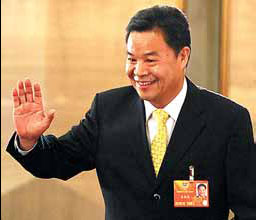Conference stands firm on islands
Updated: 2013-03-03 06:57
By Zhang Yunbi and Ding Qingfen (China Daily)
|
|||||||||
Tokyo must "shoulder all consequences" if it prompts any friction by using military vessels and planes to harass regular Chinese patrols around the Diaoyu Islands, a Chinese official warned on Saturday, as tension over territorial dispute continued.
Lyu Xinhua, the newly appointed spokesman for the first session of the 12th National Committee of Chinese People's Political Consultative Conference, made the remarks in his debut briefing in response to a question from China Daily regarding the islands situation.
 |
|
Lyu Xinhua, spokesman of the first session of the 12th CPPCC National Committee, addresses a news conference in Beijing on Saturday. Zhu Xingxin / China Daily |
Yang Bojiang, an expert on Japanese studies at the Chinese Academy of Social Sciences, said the spokesman's remark signals a solemn warning against Tokyo's recent provocations, as "in the past year, Japan has taken initiatives at every key timing to escalate the islands situation".
The Japanese government last September illegally "purchased" part of the islands, a move that has dramatically strained Sino-Japanese ties.
Beijing has enhanced regular patrols around the islands since, and in December Japan scrambled fighter jets in an effort to prevent China Marine Surveillance aircraft from flying.
Chinese officials have also charged that Japan tarnished the image of the Chinese military by spreading groundless allegations about the so-called radar targeting a Japanese gunboat by China.
Japanese Prime Minister Shinzo Abe, in a policy speech on Thursday to his country's lower legislative house, cited the alleged 'radar lock-on' incident as "a dangerous move that may escalate the situation".
Liu Jiangyong, an expert on Japanese studies and deputy dean of the Institute of Modern International Relations at Tsinghua University, said Japan has broadcast its baseless allegations against China to induce the international community to step up pressure on China.
"Consensus has been reached within Japan that blaming China and hyping the threat of China can help the government win more domestic public support," Liu said.
As a peace-loving country, China will not incite trouble, "nor will it be afraid of any troublemakers", said Lyu, the spokesman of the top political advisory body's annual session.
"We will never back down on issues related to China's territorial sovereignty," Lyu said.
During Abe's latest trip to Washington in late February, his appeal for greater support from Washington received a cold response from President Barack Obama on issues regarding the dispute and policies toward China.
Wang Fan, assistant president of the China Foreign Affairs University, warned that some key territorial issues, including the Diaoyu Islands dispute, have been utilized as "bargaining chips" to rein in China.
"Some countries are resorting to territorial issues to derail China's steady pace of development and even prompt it to change its peaceful development strategy," Wang warned.
The spokesman confirmed that diplomatic communications have continued between Beijing and Tokyo in an ongoing effort to manage the crisis.
China has been hyped as a threat to neighbors, but China has never posed a threat in its defense positions, Wang said, and it is "never a stumbling block but a protector" of navigation freedom in the region.
"It is also necessary to clarify that China has shown consistency in guarding sovereignty in the past century, and this has nothing to do with the rising strength of the country," Wang said.
Meanwhile, analysts predicted that it is unlikely for Tokyo, in the near future, to change its stance on the islands dispute.
As the Japanese upper house election will probably be held in July, coming out on top in the power reshuffle is the ruling Liberal Democratic Party's top priority. That means Tokyo will give little ground while trying to pit its strength against Beijing, Yang Bojiang said.
"We are still unlikely to see major conflict between China and Japan taking place over the islands, as China has upheld dialogue as the best option while the US has told Japan to act calmly," Liu Jiangyong said .
The sessions of the National People's Congress, which is China's legislature, and the National Committee of the CPPCC, the top political advisory body, will open on Tuesday and Sunday, respectively.
Contact the writers at zhangyunbi@chinadaily.com.cn and dingqingfen@chinadaily.com.cn.
Special coverage:
2013 NPC & CPPCC

 Li Na on Time cover, makes influential 100 list
Li Na on Time cover, makes influential 100 list
 FBI releases photos of 2 Boston bombings suspects
FBI releases photos of 2 Boston bombings suspects
 World's wackiest hairstyles
World's wackiest hairstyles
 Sandstorms strike Northwest China
Sandstorms strike Northwest China
 Never-seen photos of Madonna on display
Never-seen photos of Madonna on display
 H7N9 outbreak linked to waterfowl migration
H7N9 outbreak linked to waterfowl migration
 Dozens feared dead in Texas plant blast
Dozens feared dead in Texas plant blast
 Venezuelan court rules out manual votes counting
Venezuelan court rules out manual votes counting
Most Viewed
Editor's Picks

|

|

|

|

|

|
Today's Top News
Boston bombing suspect reported cornered on boat
7.0-magnitude quake hits Sichuan
Cross-talk artist helps to spread the word
'Green' awareness levels drop in Beijing
Palace Museum spruces up
First couple on Time's list of most influential
H7N9 flu transmission studied
Trading channels 'need to broaden'
US Weekly

|

|








